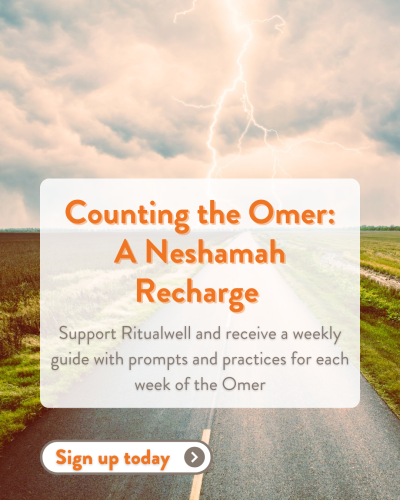Yom HaZikaron cannot only be about our own pain, for we will continue to hurt as long as others hurt.
During the omer period, the Jewish people move from mourning towards joy. In this blog post, Rabbi Ela Merom asks complex questions about how we use communal memory during this process. As we move through the sorrow of Yom HaZikaron to the exuberance of Yom Ha’Atzmaut, we invite you to consider these questions as well.
How fitting it is that we Jews have linked together remembrance with independence. Afterall, isn’t that what independence is all about? How can we be entirely free, or not dependant, unless we fully remember who we are? The Days of Awe, the 10 days of repentance culminating in Yom Kippur, also begin with a Yom HaZikaron[1], a day of remembrance, otherwise known as Rosh Hashanah.
Just as in the days of “returning” (teshuvah), let us remember wholly and fully even as we feel the pain of the ways we are not “there” yet, the ways we have been hurt, and the ways we have hurt others. This will lead us to a more profound recollection of who we can be and of who we already are. Let us embrace, re-member it all. Then ̶ and only then ̶ can we be free.
Yom HaZikaron cannot only be about our own pain, for we will continue to hurt as long as others hurt. But we have to be in touch and allow ourselves to mourn. In Israel this grief is very real; many have lost a friend, a relative, a family member. We should be able to mourn Jews who have died and suffered, and we should be able to mourn Jews who have killed and inflicted suffering. Let us allow for this sadness to be present and real before it turns to anger. Let us cry and mourn together and hold each other, say Kaddish, ask for rakhamim (compassion), ask to be full of it, and pray that it should manifest ever so greatly.
A new Israeli congregation, Beit Tfila Israeli, has created a beautiful ritual of a havdalah ceremony to transition us from the day of mourning to the day of celebration; from remembrance to independence[2]. It is in that liminal time, ben hashmashot, ̶ when we are exposed to delicate complexity ̶ that we truly affirm both sides, breathe deeply and hold it all. Can we do that? Just for a short while can we be there and know it? Can we truly remember: how we have messed up, what we have accomplished and how far we have come as a nation since we were slaughtered by the millions? Can we remember: what we have established, where we have wronged ourselves and where we have wronged our fellow nations, particularly the Palestinians? And when have we risen to the occasion and been a source of healing? Can we remember the ways we are not living up to our own standards, and the ways we have surpassed anything we or our ancestors could have imagined? Can we feel: our strength, our pain, the ways we were harmed and how that felt, and the ways we have inflicted harm and how that felt? Can we feel the ways we are unique, creative, alive, aligned? When we hold all of this, that is when we can really celebrate independence and embrace this kind of “out there” ongoing project called a Jewish state in the Land of Israel; a state that has come to be in our lifetime, that we are able to witness, be moved by, cry about, wish it were different, and celebrate.
[1]In Liturgy it is referred to as יום הזיכרון for example:
“יום הזיכרוןברוך אתה א-דני א-לוהינו מלך העולם אשר קידשנו במצוותיו וציוונו להדליק נר של שבת ושל “
and of course the central part of Rosh Hashanah prayer service is זיכרונות.
[2]This ritual will soon be translated into English by Ritualwell
Rabbi Ela Merom (RRC ’11) gives lectures on Israeli culture and society and is a contributing scholar to State of Formation, an online interfaith magazine. She is a spiritual director, a leader of Jewish Mindfulness workshops, a seeker of truth, and is fascinated with the paths to the divine in the everyday and the extraordinary . Ela is currently birthing a new progressive minyan, Eden Mikedem, in Tel Aviv where she lives and works.






